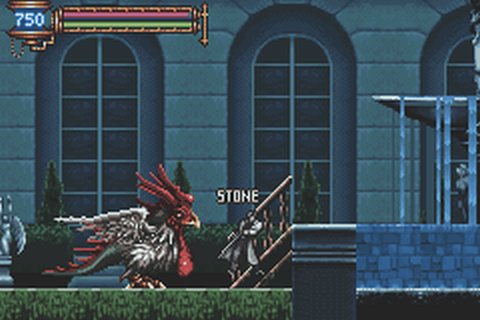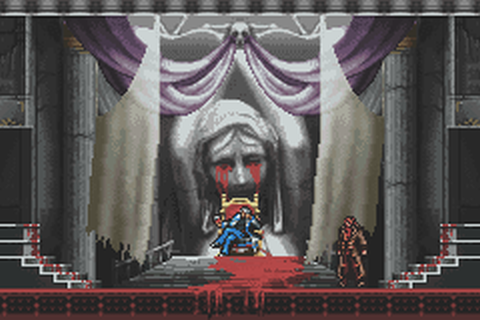Castlevania: Aria of Sorrow
Castlevania: Aria of Sorrow is the third installment of Castlevania in the Gameboy Advance system, and is a much more polished product than its predecessors, featuring a vast selection of weapons, sub-weapons and abilities, as well as colourful NPCs.
What I enjoy most: Using different combinations of weapons & abilities; great pacing & feeling of growth throughout the game
setting
You play as Soma Cruz, a high school student studying in Japan, who was suddenly transported to Dracula's castle with Mina, a childhood friend. Upon arrival, you also discovered that you have the Power of Dominance, which is the power to steal the souls of monsters and use them as your own abilities.
Exploration
Comparing to the previous 2 games, there is a better sense of progress, with less backtracking and less aimless wandering. There is a single map (plus a smaller zone for the "secret" ending) with well located save-points and warp rooms. Mina and Hammer, the shopkeeper, are always located at the entrance of the castle, which gives a nice feeling of a home-base. All other zones are themed and have their own enemies. There are also secret rooms and dead-ends with special items.
Combat & Abilities
Not being a member of the Belmont family, you are not limited to the whip, but rather have tens of weapons to choose from - some available from the shop, but many more from exploring the castle.
Your Power of Dominance gives rise to 3 separate classes of abilities. One act as a sub-weapon, which result in a much higher variety compared to previous games; one is an active special ability, for example let you float or gives you a shield; and the third is a passive ability, for example boost your stats or allow you to walk on water. There are some situations which require you to equip specific abilities, but in general you are free to experiment and choose your own playstyle - which is one of the joy of this game.
Overall, the enemies and boss fights are not extremely difficult in this game. They provide some challenges and many varieties, and the responsive control encourages dodging and fine movements - but of course you can brute force most encounters with overlevelling and healing items. But at least you are limited to carrying 9 of every item.
Plot & NPC
The plot of the game is not spectacular by any means, but is kind of intriguing - especially if you want to dig into the source materials and link it to other games in the series. And even if you are not into the lore of Dracula, the NPCs remain memorable, and your conversations with them give the game some human touch.
Conclusion
Castlevania: Aria of Sorrow is a worthy successor to Symphony of the Night - some would even say it surpasses SOTN. It gives the player everything one would look for in a Castlevania game, plus the versatile (and fun) soul/ability system. Graphics and music are both great; the story and the NPC are cute; and the gameplay and exploration are excellent. It cannot be as innovative as Symphony of the Night, but as a package it is so well polished and fun. Highly recommended.
(2018/11/19)
List of metroidvania elements
Basic information
Name of game: Castlevania: Aria of Sorrow
Developer / Publisher: Konami
System: Gameboy Advance
Year of publication: 2003
Mechanics
Style of combat: Melee
Use of magic: Yes
Combat-focus versus Platform-focus: Combat-focus
Death mechanics: Save-game
(Fall damage): No
Progression
Levelling / Farming for XP: Yes
Farming for Gold / Item: Yes
Skill pick-up: Yes
(Skill-tree): No
(Stats allocation): No
(Crafting): No
Exploration
Free-roaming: Yes
Gated by movement abilities: Yes
Gated by bosses: Yes
Type of world map: Single map+
World generation: Fixed map
Auto-map: Yes
Additional game modes
Hard modes (no souls or no items)
Julius mode
Buss rush mode
Other elements
Tactical soul system (stealing abilities from monsters)



